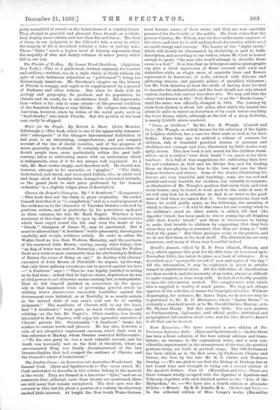Mayers, the Despot's Champion. By "A Southern." (Longmans.) — This
book does not lay claim to great originality. Its author himself describes it as "a compilation," and as a rearrangement of the evidence as to the character of Viscount Dundee collected by previous writers, and in particular by his portentous apologist in three volumes, the late Mr. Mark Napier. Whether it was necessary at this time of day to open up afresh the controversies which have raged round the life and even the death of the "bloody" champion of James II., may be questioned. But it must be allowed that "A Southern" writes pleasantly, investigates carefully, and weighs evidence calmly. He seeks to refute Sir Walter Scott no less than Wodrow, Macaulay, and the partisans of the martyred John Brown,—noting, among other things, that "no flag of truce was sent at Drumclog ; and nothing Sir Walter Scott ever wrote is more censurable than his attributing to Balfour of Burley the crime of firing on one." In dealing with Clavers' execution of John Brown of Priesthill—he argues, by-the-way, that only three military executions can be proved against his hero
— "A Southern" says :--" That he was legally justified in acting as he had done ; indeed that he had no choice, deprived as he was of civil powers to act otherwise undo]; existing law, is indisputable. That he felt himself justified in conscience by the neces- sity in that imminent crisis of preventing general revolt by striking terror wheresoever successful hostilities against the Government were initiated, as at Newhills, is as nearly certain as the inward state of any man's soul can be to earthly judgment." The assailants of Clavers will, to say the least, find "A Southern's " book quite as much worth reading—and refuting—as the late Mr. Napier's. Other readers, less keenly interested in dead disputes, will enjoy his agreeable narrative of Clavers' private life. Occasionally "A Southern" treats his readers to curious words and phrases. He has also, however, a vein of not altogether unpleasant sarcasm, which finds vent in this reference to Mackay, whom Dundee routed at Killiecrinkie — "To his own party he was a most valuable servant, and his death was heroically met on the field of Steinkirk, where an uncovenanted King was finally disembarrassed of the last Irreconcileables that had escaped the carbines of Clavers, and the Council's edicts of banishment."










































 Previous page
Previous page